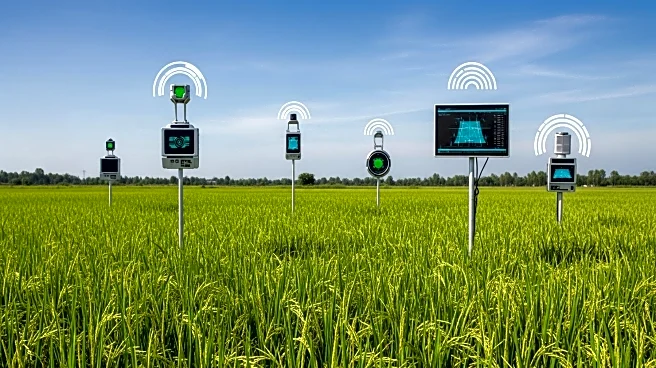What's Happening?
BASF, in collaboration with the International Rice Research Institute (IRRI), has conducted Global Carbon Field Trials focusing on rice cultivation. The trials aimed to evaluate climate-smart technologies and interventions that could reduce greenhouse gas emissions from rice farming, which traditionally contributes significantly to agricultural emissions. The findings indicate that a 30% reduction in greenhouse gas intensity is achievable without compromising rice yields. Key interventions include alternate wetting and drying, direct seeded rice, and improved straw management, which also reduce freshwater usage. BASF's AgBalance® Life Cycle Assessment model was used to estimate on-farm emissions, providing farmers with reliable data to access carbon markets and potentially increase their operational value.
Why It's Important?
The results of BASF's trials are significant for the agricultural sector, particularly rice farmers, as they offer a pathway to more sustainable farming practices. Rice is a staple food for over 3.5 billion people globally, and its cultivation is a major contributor to greenhouse gas emissions. By implementing these climate-smart practices, farmers can reduce their environmental impact while maintaining productivity. This aligns with broader efforts to combat climate change and supports farmers in adapting to extreme weather conditions. The ability to access carbon markets could provide additional financial incentives for farmers, promoting wider adoption of sustainable practices.
What's Next?
BASF plans to continue its Global Carbon Field Trials as part of its commitment to reduce CO2e emissions in agriculture by 30% by 2030. The company emphasizes the need for collaboration across the agricultural value chain, including partnerships with farmers, research institutes, and other stakeholders. Future efforts will focus on scaling these climate-smart solutions and supporting farmers in adopting them. BASF aims to turn insights from these trials into actionable strategies that can be implemented on a larger scale, potentially transforming agricultural practices worldwide.
Beyond the Headlines
The trials underscore the importance of integrating sustainability into agricultural practices, highlighting the potential for innovative solutions to address environmental challenges. The collaboration between BASF and IRRI exemplifies the role of science-driven partnerships in advancing climate resilience. These efforts contribute to a broader understanding of how agriculture can adapt to and mitigate the impacts of climate change, fostering a more sustainable future for food production.









